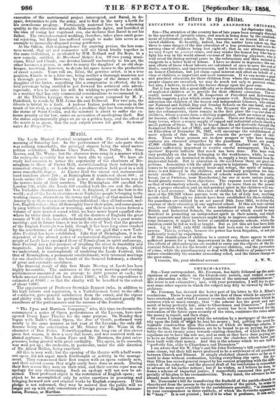Liugir.
The Leeds Musical Festival terminated with The Messiah, on the morning of Saturday last. In the performance of the solo parts there was nothing remarkable, the principal singers being the usual metro- politan celebrities, Madame Clara Novelle, Miss Dolby, Mr. Sims Reeves, and Mr. Weiss ; but the choruses were sung in a manner which the metropolis certainly has never been able to equal. We have al- ready had occasion to notice the superiority of the choristers of Bir- mingham to those of Exeter Hall, notwithstanding their inferiority in numerical strength : at Leeds the same observation held good in a still more remarkable degree. At Exeter Hall the choral and instrumental band numbers above 700 ; at Birmingham it numbered about 500 ; at Leeds under 350: while the real power of these tuneful hosts was in the inverse ratio of their numbers. The Birmingham 500 excelled the London 700, while the Leeds 350 excelled both the one and the other. The Yorkshire choristers are the best in England, if not the best in the world ; and all the Leeds choristers were Yorkshire people belonging to the working classes, drawn from the towns and villages of that musical land. Among them there was not one useless individual : they all had sound, mel- low, English voices ; they all thoroughly knew their parts, and consequent- ly sang without hesitation or wavering, and their united voices formed a volume of pure musical sound which we have never beard equalled else- where by twice their number. Of all the districts of England the great county of York is the best able to furnish the materials for a great music- meeting ; and in former times it was in the city of York that the greatest of the English Festivals was held, though it has been long since crushed by the interference of clerical bigotry. We are 'clad that a new York- shire Festival has been established. Like that of Birmingham, it is in- dependent of the abused power of ecclesiastical dignitaries : and as the people of Leeds have emulated those of Birmingham in spirit and energy, their Festival has a fair prospect of rivalling the other in durability and magnitude. And this prospect is all the greater for the design, (which we understand, is contemplated) of rendering the Leeds Festival, like that of Birmingham, a permanent establishment, with triennial meetings for one charitable object, the benefit of the General Infirmary, a charity of great and extensive usefulness.
The financial result of this first Music Meeting at Leeds has been highly favourable. The audiences at the seven morning and evening performances amounted on an average to 2000 persons at each ; the whole amount received has been about 75001., while the expenditure is estimated at 60001.: so that the charity will be benefited to the extent of about 15001.
The appointment of Professor Sterndale Bennett (who, in addition to his high talents and reputation, is a Yorkshireman born) to the office of conductor, gave general satisfaction from the outset, and the vigour and ability with which he performed his duties, enhanced greatly the excellence of the performances and the success of the Festival.
" The Fyne and Harrison Company," who, this time twelvemonths, commenced a series of Opera performances at the Lyceum, have now opened Drury Lane Theatre for the same purpose. On'Monday they began with Balfe's Comic Opera, the Rose of Castile, performed nearly in the same manner as last year at the Lyceum ; the only ference being the substitution of Mr. Glover for Mr. Weiss in the character of Don Pedro. Notwithstanding the long run of this clever piece last season, it drew a very full house, and was received with un- abated applause ; Miss Louisa Pyne and Mr. Harrison, the joint entre- preneurs, being greeted with great cordiality. The opera, in its ensemble, was well got up ; the orchestra, in particular, under the able direction of Mr. Alfred Mellon, being excellent.
All this is very well ; but the opening of the theatre with a half worn- out opera did not argue much forethought or activity in the manage meat. They commenced their first season with an opera entirely new, and their second season they might easily have done as much. During their first season they were on their trial, and their novitas regni was an apology for any shortcoming. Such an apology will not now be ad- mitted. Their professed object is the restoration of English opera ; an object to be accomplished only by active exertions in procuring and bringing forward new and original works by English composers. If this
f=, is not redeemed, they may be assured that the public will no put up with stale concoctions of foreign pieces--English Sonnam- hulas, Normas, or Martinis.


























 Previous page
Previous page